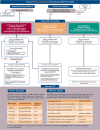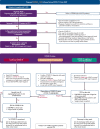Management of Acute Coronary Syndromes During the Coronavirus Disease 2019 Pandemic: Deviations from Guidelines and Pragmatic Considerations for Patients and Healthcare Workers
- PMID: 33318752
- PMCID: PMC7726851
- DOI: 10.15420/icr.2020.21
Management of Acute Coronary Syndromes During the Coronavirus Disease 2019 Pandemic: Deviations from Guidelines and Pragmatic Considerations for Patients and Healthcare Workers
Abstract
Coronavirus disease 2019 (COVID-19) is forcing cardiology departments to rapidly adapt existing clinical guidelines to a new reality and this is especially the case for acute coronary syndrome pathways. In this focused review, the authors discuss how COVID-19 is affecting acute cardiology care and propose pragmatic guideline modifications for the diagnosis and management of acute coronary syndrome patients, particularly around the appropriateness of invasive strategies as well as length of hospital stay. The authors also discuss the use of personal protective equipment for healthcare workers in cardiology. Based on shared global experiences and growing peer-reviewed literature, it is possible to put in place modified acute coronary syndrome treatment pathways to offer safe pragmatic decisions to patients and staff.
Keywords: COVID-19; acute coronary syndrome; angioplasty; safety; thrombolysis.
Copyright © 2020, Radcliffe Cardiology.
Conflict of interest statement
Disclosure: HS has received research funding from Amgen. SS has received speaking fees from AstraZeneca, Pfizer and Philips Volcano, and an educational grant from Medtronic. SN has received speaking fees from Philips Volcano. RAL has received speaking fees from Philips Volcano. RP has acted as a consultant for Philips. All other authors have no conflicts of interest to declare.
Figures



References
-
- Ibanez B, James S, Agewall S et al. 2017 ESC guidelines for the management of acute myocardial infarction in patients presenting with ST-segment elevation: the Task Force for the management of acute myocardial infarction in patients presenting with ST-segment elevation of the European Society of Cardiology (ESC). Eur Heart J. 2018;39:119–77. doi: 10.1093/eurheartj/ehx393. - DOI - PubMed
-
- Roffi M, Patrono C, Collet J-P et al. 2015 ESC guidelines for the management of acute coronary syndromes in patients presenting without persistent ST-segment elevation: Task Force for the Management of Acute Coronary Syndromes in Patients Presenting without Persistent ST-Segment Elevation of the European Society of Cardiology (ESC). Eur Heart J. 2016;37:267–315. doi: 10.1093/eurheartj/ehv320. - DOI - PubMed
-
- Amsterdam EA, Wenger NK, Brindis RG et al. 2014 AHA/ACC guideline for the management of patients with non-ST-elevation acute coronary syndromes: a report of the American College of Cardiology/American Heart Association Task Force on Practice Guidelines. Circulation. 2014;130:e344–426. doi: 10.1161/CIR.0000000000000134. - DOI - PubMed
-
- Levine GN, Bates ER, Blankenship JC et al. 2011 ACCF/AHA/SCAI guideline for percutaneous coronary intervention: executive summary: a report of the American College of Cardiology Foundation/American Heart Association Task Force on Practice Guidelines and the Society for Cardiovascular Angiography and Interventions. Circulation. 2011;124:2574–609. doi: 10.1161/CIR.0b013e31823a5596. - DOI - PubMed
-
- O’Gara PT, Kushner FG, Ascheim DD et al. 2013 ACCF/AHA guideline for the management of ST-elevation myocardial infarction: a report of the American College of Cardiology Foundation/American Heart Association Task Force on Practice Guidelines. Circulation. 2013;127:e362–425. doi: 10.1161/CIR.0b013e3182742cf6. - DOI - PubMed
Publication types
Grants and funding
LinkOut - more resources
Full Text Sources

